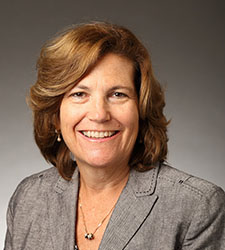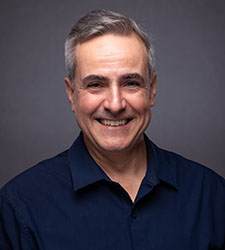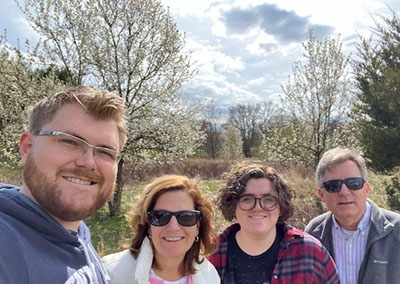Lal-Nag, Souza and Burton Step Up to the SLAS Board of Directors
January 13, 2025

January 13, 2025
Ring in the new year with three talented, hard-working leaders who will join the SLAS Board of Directors at SLAS2025. Please meet Marybeth Burton, M.S., Madhu Lal-Nag, Ph.D., and Glauco Souza, Ph.D., in this question-and-answer e-zine article. Along with six current SLAS Board members, this trio is prepared to invest their professional experience, enthusiasm and imagination to further SLAS’s mission to deepen engagement from its global community.

Marybeth Burton, M.S., is executive director, Discovery Sample Management for Merck, USA (New York, NY, USA), with more than 25 years of experience advocating for automation adoption in the pharmaceutical industry, dedication to optimizing drug discovery processes and commitment to fostering a diverse and high-performing team.
As an enthusiastic proponent of exploring and implementing new technologies, Burton is excited to take on a position on the SLAS Board of Directors. As an active SLAS member, she has engaged with life sciences colleagues about automation and engineering innovations and has found encouragement to take bold risks and venture beyond her comfort zone in the profession. One of the most significant risks was undertaking the leadership of a project to establish a first-generation automated compound storage and plate production facility at a major pharmaceutical company early in her career.

Madhu Lal-Nag, Ph.D., chief scientific officer for InSphero AG, Switzerland (Zurich, Switzerland), began her long participation in SLAS while still in graduate school. When she started her career in high-throughput screening in 2012 — building 3D tumor models for screening — SLAS became a go-to resource for everything. She was impressed by the SLAS volunteers’ commitment to the organization, which is one of the reasons she wants to serve now. As a presenter, organizer and teacher in SLAS-sponsored workshops and courses, Lal-Nag also held the title of co-editor for a special issue of SLAS Discovery focused on 3D models and served on the program committee for the same. For 2025, Lal-Nag will serve among the SLAS officers in the role of secretary for the SLAS Board of Directors.

Glauco R. Souza, Ph.D., is director of global business development and innovation, bioscience for Greiner Bio-One, USA, (GBO; Monroe, NC, USA). Since joining SLAS in 2015, Souza has demonstrated deep commitment by taking on increasing responsibilities, such as chairing the Knowledge Content & Delivery Council (KCDC) in 2023 and serving on the Americas Scientific Program Committee (ASPC) since 2022. Souza also helped organize and participated as a session chair for three Building Biology in 3D symposia and served as a guest editor for two special issues of SLAS Discovery.
As the former CEO of Nano3D Biosciences and current director of global business development and innovation at GBO, Souza brings a unique global perspective to the life sciences landscape with his entrepreneurial path resulting in numerous patents/products and dozens of publications.
Burton: I joined SLAS via the Association for Laboratory Automation (ALA) early in my career as my company began exploring large-scale automation for small molecule compound management. [Editor’s note: ALA merged with the Society for Biomolecular Sciences (SBS) to form SLAS in 2010]. The annual conference served not only as a comprehensive platform to showcase cutting-edge technologies and their applications but, more importantly, it provided invaluable networking opportunities with industry peers who were navigating similar challenges in the rapidly evolving sample management field.
Lal-Nag: I became a member of ALA as a graduate student. At the time, I was working on a business in bioscience degree and was trying to understand how automation really contributed to increased efficiency in therapeutic development. Over the years, as the organization grew into its identity as SLAS, I finished my Ph.D. and joined the organization as an early career scientist. The exposure to new and innovative ideas, the platforms to explore them and the network that I was able to leverage because of SLAS have been instrumental in my journey.
Souza: I joined SLAS in 2015 because it brings together many things I'm passionate about — entrepreneurship, science and technology. I've been involved in roles such as chair of the Enabling Technologies track, a member of the Knowledge Content & Delivery Council, and a guest editor for SLAS Discovery. SLAS is an ideal platform for connecting people within the life sciences community and bridging different aspects of laboratory automation, drug development and screening. The synergy between academic innovation and industry applications creates unique opportunities for collaboration and growth.

Burton: For most of my career I have worked in drug discovery at large pharma. While I started out as a biological information scientist responsible for storing and mining screening data, I rather quickly found myself responsible for my company’s ‘crown jewels’ at a time when collection growth far outpaced distribution and storage capabilities. I not only had to learn how peer companies were tackling this problem, but I needed to put a strategic plan in place for investment in technologies and facilities. This journey continued through merger and acquisition and many more fast-paced advances in drug discovery technologies. Throughout my career I have learned that flexibility, adaptability and a great team are key for success. For me, that extended team included colleagues from the SLAS community who provided a venue for information sharing, access to new technologies and very sound advice. These experiences have honed my strategic thinking and leadership skills, which I am eager to bring to the SLAS Board.

Lal-Nag: I am a firm believer that we are a sum total of all our experiences. From the perspective of my career in academia, government and industry, I think my biggest takeaway has been that anything worthwhile is built on a foundation to which many people contribute. From therapeutic development to automation, it takes multiple disciplines and many perspectives working in concert to achieve something. In life as well, be it parenting or volunteering, it takes a community to build an environment in which everyone feels comfortable and to which everyone can contribute. I look at SLAS as that community and to the Board as stewards of that community.

Souza: My career spans academia, entrepreneurship and business development, giving me a broad and pragmatic perspective on life sciences. Founding Nano3D Biosciences (2008) and leading its acquisition by Greiner Bio-One (2019) provided me with hands-on experience bridging ideas to commercialization. My MBA in business analytics, combined with my scientific background and leadership roles within SLAS, have given me the tools to help guide SLAS in this fast-moving AI and data-integration era. These experiences have sharpened my strategic thinking. Being a dual citizen of Brazil and the U.S., while working globally, gives me the multidisciplinary and multicultural global perspective that aligns with SLAS's mission.
Burton: I am eager to champion and expand upon SLAS’s initiatives in diversity, equity, inclusion and sustainability. At SLAS2023, I attended the Women of SLAS session where I was profoundly impressed and inspired by the incredible talent and valuable experiences shared by the participants. Likewise, SLAS’s strong commitment to sustainability, paired with its engagement with a diverse community of technology vendors, positions us well to make a significant impact. I propose that SLAS continues its collaboration with these technology providers to effectively showcase and quantify the benefits of sustainable technologies and workflows in our field.
Lal-Nag: As a newly elected board member I think one of the most important things would be to understand what initiatives have worked and more significantly, which ones have not worked and why? We must not forget that we are still recovering from the aftereffects of the pandemic, the aftershocks of which are still being felt. For me, having a better understanding of what initiatives have never been rolled out and which ones have and have failed (for whatever reason) will be key to positioning a strategy that outlines a roadmap for how to engage various communities in academia, government and industry at multiple levels, from the graduate student to the CEO. I am also very driven to roll out educational initiatives on a global scale to enable the best minds to engage in science.
Souza: Having served on various SLAS committees and as an editor, I have gained an understanding of SLAS's strengths and areas for growth. I aim to help SLAS navigate the convergence of AI, automation and data integration while reinforcing our core mission of education and global collaboration. My experience in technology development and commercialization equips me to bridge communication gaps between academia, technology providers, pharma and CROs. I believe this is the perfect moment to contribute meaningfully to SLAS's future by strengthening cross-sector connections and ensuring SLAS remains the leading scientific and professional society at the forefront of innovation. I am committed to promoting initiatives that encourage entrepreneurship, technological advancement, mentorship and sustainability within the life sciences community while expanding efforts to elevate SLAS's profile and broaden our global reach.
Burton: I’m excited to work with other board members to shape strategic initiatives that will continue to enrich collaboration, education and innovation in our SLAS community. I have benefitted a great deal from this community, so I would like to enable the same for others.
Lal-Nag: The most exciting thing about taking on this responsibility is the opportunity to make a difference with other like-minded people. When people take on additional responsibilities that are not part of their day job, it signals a deeper commitment and desire to make a difference. I feel a commitment to make a difference in the awareness and education of scientists across the world when it comes to life sciences discovery and technology.
Souza: What excites me most is the opportunity to help shape SLAS's future at a pivotal turning point for our field. With the rise of AI, data integration and sustainability initiatives, we have a unique chance to strengthen SLAS's role as a key connector across sectors. Since joining SLAS in 2015, I've seen its evolution firsthand, and I'm enthusiastic about contributing to the next strategic plan beyond 2026 by applying my multidisciplinary experience.
Burton: SLAS is uniquely positioned to act as a catalyst for adoption of innovative technologies in the laboratory environment. By strategically aligning our direction with the ongoing technological evolution, SLAS can foster a culture of continuous improvement and adaptability during a period of rapid innovation. By increasing awareness of transformative innovations, SLAS can help to redefine laboratory best practices and enhance operational efficiencies.
Lal-Nag: I think where SLAS could make the greatest impact in the next two years would be in leveling out the playing field. One of the most visible commitments that SLAS has always made has been to give opportunities to early career scientists, something that is not commonplace with other professional organizations. In the next two years, if we could ensure more adoption and importance of technology in workflows around the world, I believe it would be a win. In the next five years, I believe that SLAS can be a steward for the use and integration of new technologies like the use of AI in multiple aspects of life sciences research and discovery.
Souza: In the next two years, SLAS will play a crucial role in guiding our community through the integration of AI and big data into laboratory automation and screening. By developing targeted educational programs and fostering collaborative research initiatives, SLAS will drive efficiency and innovation across the field, directly benefiting our members. Looking ahead five years, I envision SLAS as a key player in shaping the ‘Lab of the Future,’ with a strong emphasis on cutting-edge technology integration, sustainability practices and the introduction of the NexusXp program at SLAS2025. Through strategic engagement in emerging markets and the creation of global partnerships, SLAS will further strengthen connections between academia, technology providers, pharma and CROs, solidifying our position as a leading society in the life sciences community.
Burton: I strongly encourage life sciences professionals and students to join and get involved! It’s a great place to learn, to share your work and to meet people with similar professional interests.
Lal-Nag: Please do it. There is an opportunity lost in not having membership. SLAS is one of those unique organizations where there is something for everyone.
Souza: I encourage you to join and get actively involved. Beyond conferences, SLAS offers an opportunity to engage with a vibrant community through volunteer roles and committee participation. The knowledge available through SLAS's journals, APPLIED (The SLAS Online Learning Center), and the SLAS New Matter Podcast provides ongoing opportunities for professional development. From my own experience, participating in SLAS committees has significantly expanded my professional network and opened professional opportunities. The global reach of SLAS is ideal for those looking to make an international impact. If you want to grow professionally and connect with innovators and innovation in life sciences, SLAS is the perfect place to start.
Burton: I like to spend time playing tennis, riding bikes, traveling to new places, taking pictures of sunsets, and visiting the beach locally in New Jersey or my favorite spot, Hilton Head Island (SC, USA).
Lal-Nag: I like to think that I spend quality time with my children in the hope that they grow up to be good and kind human beings. I also co-founded a non-profit, Hope Works, that delivers ‘Hope Boxes’ to children in pediatric oncology wards across the country to help them smile a little. I am an avid runner and hope to continue my streak of at least one if not two marathons a year.
Souza: My mantra is 'What doesn't kill you makes a good story,' and raising young kids in Charlotte, NC, (USA), means that mantra meets reality every day. Between swim meets with Olivia (10) and Ian (8), and my master water polo with the Charlotte Sharks, the pool is practically our second home. My wife, Kristin, is a lifelong competitive swimmer, and with my own history of playing and coaching water polo throughout my life, being near water is second nature. When we need a change of scenery, we escape to the North Carolina mountains. Seven Devils is our family's spot, with Grandfather Mountain Winery for body and mind restoration, while kids and Smoky (our Bernese Mountain Dog) play in the rocks at the New River. Beyond family time, I still engage with the entrepreneurial community and mentor startups whenever I can. Balancing life with energetic kids, my passion for water polo and science, and my commitment to lifelong learning continually spawn new stories — and thankfully, I am still here to share them all.





Burton: While attending the 2022 SLAS Sample Management Symposium in La Jolla, I became fascinated by the paragliders over the Pacific Ocean near the conference venue. I had the opportunity to ‘jump’ outside my comfort zone and actually gave it a try — it was an amazing experience!
Lal-Nag: I love what I do, and I do what I love. It took a long time for me to grow into myself but now that I am here, my life is dedicated to ensuring that to the best of my ability, inequality of any kind in education and access to information in the scientific arena does not exist.
Souza: I believe meaningful outcomes are best fostered between people connected by shared interests, ideas, sports and cultures. In my TEDx Houston talk years ago, I shared how the intersection of science, levitating cells, friendship and sports became the foundation for scientific discovery and entrepreneurship. My journey began when I came to the U.S. in 1990, barely speaking English, to play water polo at George Washington University. Later, water polo connected me with brilliant physicist Tom Killian and entrepreneur Dave Lee, and casual post-practice pub meetups eventually led to co-founding Nano3D Biosciences. Later, during my marathon years, Dave and I co-founded the BON Running Club in Houston, which grew from casual gatherings to hundreds of members. Today, as an SLAS Board Member, I remain committed to fostering meaningful connections. Having benefited greatly from mentorship, especially from lifelong friends like Professor Houston Miller, I hope to help the next generation of professionals. My life hypothesis is that the most compelling stories and meaningful outcomes emerge when people with shared passions come together for a common purpose.
Paragliding Tips and Tricks for Adventurists Far and Wide
What's a Good Age to Start Water Polo?